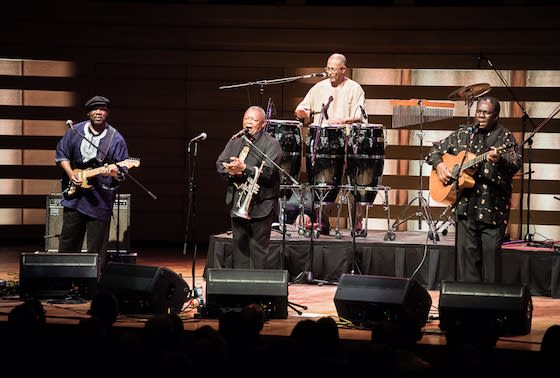Hugh Masekela has been touted as being perhaps the most important jazz and world musician alive today. Vusi Mahlasela is acknowledged as the "voice of Africa" through his poet activism and incredible guitar playing abilities. Together again on this night (February 28), the two artists delivered a stirring celebration of African freedom and independence through song.
Both South African artists have juxtaposing styles: Masekela on the trumpet and flugelhorn was a case study in graceful, masterful instrumental control, while the acoustic guitar stylings of Mahlasela delivered a layered, rich timbre. The two artists have been rightly called South African freedom fighters, having withstood the brutal legacy of South African apartheid, and playing a key political and artistic role in the anti-oppression movement at the time. Music had a crucial part to play towards the legalization of the African National Congress (ANC) and the release of Nelson Mandela; artists such as Masekela and Mahlasela no doubt played a key part in this.
Playing equal parts showman, storyteller and musician, Masekela referred to the musical takes as being complementary, as part of the "kaleidoscope of Africa." The six-piece ensemble dropped gems like "Grazing in the Grass," while urging older audience members to get up and "not break anything" as they jam to the tune — and the always powerful "Coal Train," with the boundless energy of Masekela belying his 70-plus years. He clearly hasn't lost a step, and his boyish dance moves and eloquent and whimsical patter between songs were thoroughly entertaining. Mahlasela's discography, while arguably not as celebrated as Masekela's, still holds its own. Songs like "Ubuhle Bomhlaba," "Thule Mama" and especially "Say Africa" brought the crowd to its feet at various junctures throughout the show.
In the 21 years since the official end of Apartheid and subsequent emergence of South African democracy, the artists expounded a message of peace, of reconciliation, and most importantly, of the "wisdom of forgiveness" and positivity through the Nguni Bantu term of Ubuntu, or human kindness. With this in mind, how could this not have been a joyful noise and, by extension, night? The musicianship and stagecraft were on point. Rumblings that the show was just a shade overlong could be dismissed; spiritually and emotionally, Masekela and Mahlasela closed the night on a nourishing high.
Both South African artists have juxtaposing styles: Masekela on the trumpet and flugelhorn was a case study in graceful, masterful instrumental control, while the acoustic guitar stylings of Mahlasela delivered a layered, rich timbre. The two artists have been rightly called South African freedom fighters, having withstood the brutal legacy of South African apartheid, and playing a key political and artistic role in the anti-oppression movement at the time. Music had a crucial part to play towards the legalization of the African National Congress (ANC) and the release of Nelson Mandela; artists such as Masekela and Mahlasela no doubt played a key part in this.
Playing equal parts showman, storyteller and musician, Masekela referred to the musical takes as being complementary, as part of the "kaleidoscope of Africa." The six-piece ensemble dropped gems like "Grazing in the Grass," while urging older audience members to get up and "not break anything" as they jam to the tune — and the always powerful "Coal Train," with the boundless energy of Masekela belying his 70-plus years. He clearly hasn't lost a step, and his boyish dance moves and eloquent and whimsical patter between songs were thoroughly entertaining. Mahlasela's discography, while arguably not as celebrated as Masekela's, still holds its own. Songs like "Ubuhle Bomhlaba," "Thule Mama" and especially "Say Africa" brought the crowd to its feet at various junctures throughout the show.
In the 21 years since the official end of Apartheid and subsequent emergence of South African democracy, the artists expounded a message of peace, of reconciliation, and most importantly, of the "wisdom of forgiveness" and positivity through the Nguni Bantu term of Ubuntu, or human kindness. With this in mind, how could this not have been a joyful noise and, by extension, night? The musicianship and stagecraft were on point. Rumblings that the show was just a shade overlong could be dismissed; spiritually and emotionally, Masekela and Mahlasela closed the night on a nourishing high.
